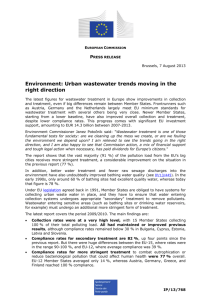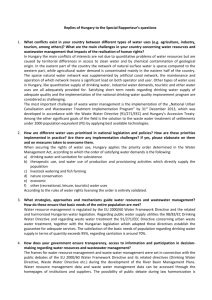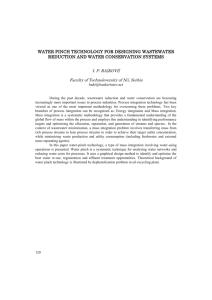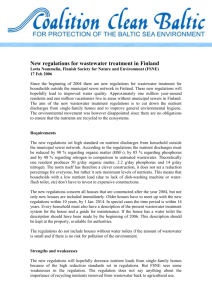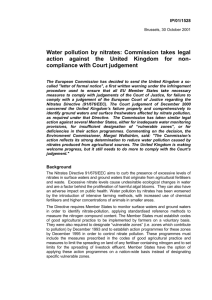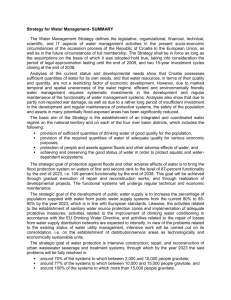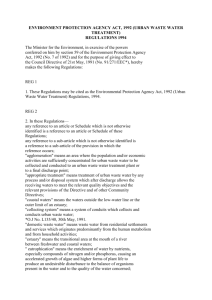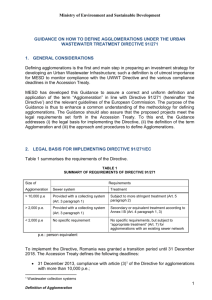DOC - Europa
advertisement
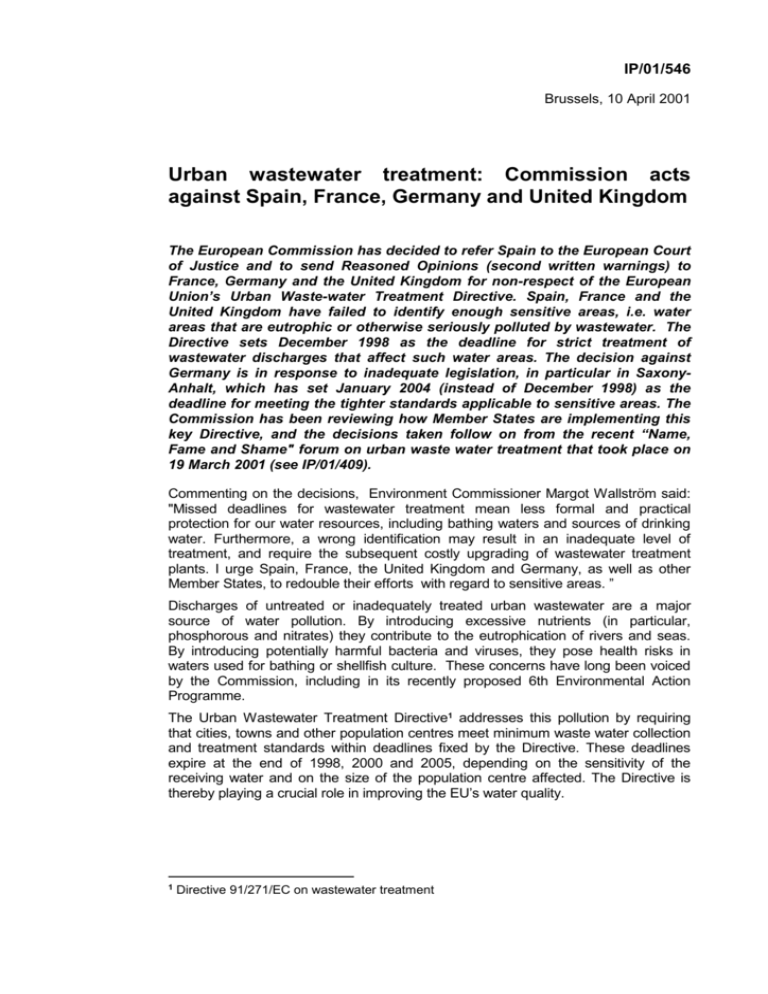
IP/01/546 Brussels, 10 April 2001 Urban wastewater treatment: Commission acts against Spain, France, Germany and United Kingdom The European Commission has decided to refer Spain to the European Court of Justice and to send Reasoned Opinions (second written warnings) to France, Germany and the United Kingdom for non-respect of the European Union’s Urban Waste-water Treatment Directive. Spain, France and the United Kingdom have failed to identify enough sensitive areas, i.e. water areas that are eutrophic or otherwise seriously polluted by wastewater. The Directive sets December 1998 as the deadline for strict treatment of wastewater discharges that affect such water areas. The decision against Germany is in response to inadequate legislation, in particular in SaxonyAnhalt, which has set January 2004 (instead of December 1998) as the deadline for meeting the tighter standards applicable to sensitive areas. The Commission has been reviewing how Member States are implementing this key Directive, and the decisions taken follow on from the recent “Name, Fame and Shame" forum on urban waste water treatment that took place on 19 March 2001 (see IP/01/409). Commenting on the decisions, Environment Commissioner Margot Wallström said: "Missed deadlines for wastewater treatment mean less formal and practical protection for our water resources, including bathing waters and sources of drinking water. Furthermore, a wrong identification may result in an inadequate level of treatment, and require the subsequent costly upgrading of wastewater treatment plants. I urge Spain, France, the United Kingdom and Germany, as well as other Member States, to redouble their efforts with regard to sensitive areas. ” Discharges of untreated or inadequately treated urban wastewater are a major source of water pollution. By introducing excessive nutrients (in particular, phosphorous and nitrates) they contribute to the eutrophication of rivers and seas. By introducing potentially harmful bacteria and viruses, they pose health risks in waters used for bathing or shellfish culture. These concerns have long been voiced by the Commission, including in its recently proposed 6th Environmental Action Programme. The Urban Wastewater Treatment Directive1 addresses this pollution by requiring that cities, towns and other population centres meet minimum waste water collection and treatment standards within deadlines fixed by the Directive. These deadlines expire at the end of 1998, 2000 and 2005, depending on the sensitivity of the receiving water and on the size of the population centre affected. The Directive is thereby playing a crucial role in improving the EU’s water quality. 1 Directive 91/271/EC on wastewater treatment The Directive required Member States to have identified sensitive areas by 31 December 1993, and to have met strict standards for discharging directly into such areas or their catchments by 31 December 1998 (including the removal of nutrients that contribute to eutrophication). The Directive also imposes several other requirements, including monitoring of wastewater discharges. Spain Whereas, in Spain, the national government is responsible for identifying sensitive areas with regard to inter-regional water areas (i.e. waters shared by more than one of Spain's autonomous regions), the autonomous regions themselves are responsible for identifying sensitive areas for both internal water-bodies and coastal waters. However, most of the autonomous regions have so far failed to formally identify sensitive areas. This means that there are significant gaps in the total list of sensitive areas identified by Spain. France The decision against France concerns several failures relating to sensitive areas. These include the identification of areas in 1999 that should have been identified by the end of 1993, France’s overly restrictive approach to fixing criteria for identifying sensitive areas, and the failure to ensure - by the end of 1998 - necessary standards governing discharging into sensitive areas . Germany The procedure against Germany relates to remaining inadequacies in German legislation to give effect to the Directive. Legislation in place in Saxony-Anhalt sets 1 January 2004 as the deadline for more stringent treatment concerning discharges into sensitive areas. The correct deadline should have been 31 December 1998. In addition, several pieces of German legislation (in particular for MecklenburgVorpommern and Northrhine-Westfalia) fail to correctly implement the monitoring requirements of the Directive. The decision taken is to send a supplementary Reasoned Opinion, to take account of developments since an earlier Reasoned Opinion was sent on 28 October 1999. United Kingdom Action is being taken against the United Kingdom because of ongoing failures to identify sensitive areas, in particular for waters that are eutrophic or in danger of eutrophication. Furthermore, difficulties have been experienced with regard to the review of sensitive and less sensitive areas in Northern Ireland. It was decided that the Commission and the UK authorities will take contact to discuss these outstanding points. Background As guardian of the EC Treaty, the Commission must make sure that the legal requirements of the Treaty and adopted legislation are respected by Member States. The procedure being followed in this case relates to Article 226 of the Treaty, which gives the Commission powers to take legal action against a Member State that is not respecting its obligations. If the Commission considers that there may be an infringement of Community law which warrants the opening of an infringement procedure, it addresses a "Letter of Formal Notice" to the Member State concerned, requesting it to submit its observations by a specified date, usually two months. 2 In the light of the reply or absence of a reply from the Member State concerned, the Commission may decide to address a "Reasoned Opinion" (or second written warning) to the Member State, clearly and definitively setting out the reasons why it considers there to have been an infringement of Community law and calling on the Member State to comply within a specified period (normally two months). If the Member State fails to comply with the Reasoned Opinion, the Commission may decide to bring the case before the European Court of Justice . 3
